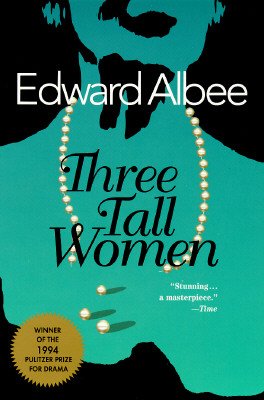Items related to Three Tall Women: A Play in Two Acts (Penguin plays...

Synopsis
A play covering the life of one woman at three different stages of her life and played by three different actresses. The original cast of the production at the Wyndhams theatre included Maggie Smith, Frances de la Tour and Anastasia Hille.
"synopsis" may belong to another edition of this title.
About the Author
Edward Albee, the American dramatist, was born in 1928. He has written and directed some of the best plays in contemporary American theatre and three of his plays: A Delicate Balance, Seascape and Three Tall Women have received Pulitzer Prizes. His most famous play, Who's Afraid of Virginia Woolf? won the New York Drama Critics Circle Award for Best Play. His other plays include The Zoo Story, The Death of Bessie Smith, The Sandbox, The American Dream, Tiny Alice, All Over, Listening, The Lady from Dubuque, The Man Who Had Three Arms, Finding the Sun, Fragments, Marriage Play and The Lorca Play.
From Booklist
Albee's best plays have always walked a line between heightened realism and dark comedy. Even his most surreal works are populated with characters who wouldn't seem out of place in real life. His 1994 Pulitzer Prize winner runs true to form. It begins as a naturalistic conversation among three women (identified as A, B, and C) from successive generations who meet in a hospital room. Each is undergoing a change from one life phase to another, and each faces her travails and disappointments with lots of Albee's trademark bitter wit. In the second act, however, the three women become representatives of the same person at different ages (26, 52, late 80s), and their bickering talk becomes a touching internal colloquy about life, love, and the inevitability of loss. Not since Beckett's brooding meditation Krapp's Last Tape has a playwright dealt so movingly with the subject of disappointment, aging, and death. Jack Helbig
"About this title" may belong to another edition of this title.
US$ 7.50 shipping from Canada to U.S.A.
Destination, rates & speedsSearch results for Three Tall Women: A Play in Two Acts (Penguin plays...
[Playbill]: Three Tall Women
Seller: Regent College Bookstore, Vancouver, BC, Canada
Soft cover. Condition: Good. 1st Edition. Penguin Books Ltd, 1995. Paperback. Condition: Good. Slight rubbing on the back cover. However, the binding is still tight and square and the text block is clean and unmarked. Seller Inventory # ABE-1602284971990
Quantity: 1 available
Three Tall Women
Seller: Clayton Fine Books, Shepherdstown, WV, U.S.A.
Soft cover. Condition: Fine. First Edition, First Printing. Fine in wrappers. AS NEW. Photograph of Maggie Smith, Anastasia Hille, and Frances de la Tour performing the play (Wyndham's Theatre, London 1994). Seller Inventory # b22068
Quantity: 1 available
Three Tall Women: A Play in Two Acts
Seller: BookAddiction (IOBA, IBooknet), Canterbury, United Kingdom
Softcover. Condition: Very Good. 112pp, [2]pp publisher's ads. Pictorial light card covers. 8vo. Light chipping to edges and wear to covers. Page margins tanning. Internally, neat, clean and tight. Seller Inventory # 018689
Quantity: 1 available
Three Tall Women: A Play in Two Acts (Penguin plays & screenplays)
Seller: WorldofBooks, Goring-By-Sea, WS, United Kingdom
Paperback. Condition: Good. The book has been read but remains in clean condition. All pages are intact and the cover is intact. Some minor wear to the spine. Seller Inventory # GOR001513254
Quantity: 1 available
Three Tall Women: A Play in Two Acts (Penguin plays & screenplays)
Seller: WorldofBooks, Goring-By-Sea, WS, United Kingdom
Paperback. Condition: Very Good. The book has been read, but is in excellent condition. Pages are intact and not marred by notes or highlighting. The spine remains undamaged. Seller Inventory # GOR003751065
Quantity: 1 available

